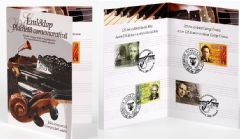Major composers: Béla Bartók and George Enescu
Magyar Posta and the Romanian ROMFILATELIA are jointly issuing a commemorative set of stamps entitled “Major Composers”. The designs of the set of two stamps show two major composers, Béla Bartók from Hungary and George Enescu from Romania, to mark the 125th anniversary of their birth. Béla Bartók (1881–1945), composer, pianist, musicologist, member of the Hungarian Academy of Sciences. Between 1892-96 he studied in Bratislava (then Pozsony) under László Erkel, the son of the celebrated Hungarian opera composer, and in 1899 he was passed into the Budapest Academy of Music. He began composing in the spirit of Brahms’ musical heritage. The years 1905–06 were a turning point in his career as a composer. His attention turned to folk music and with Zoltán Kodály’s help he began his systematic collecting work. In the years after World War I he was engaged on concerts abroad. He won recognition as a performer and composer around the world. As a folklorist, he spent the 1920–30s processing and academically assessing the enormous collection of folk songs he had amassed earlier. After the outbreak of World War II, he and his wife left Hungary and settled in the United States of America in 1940. His years in America were plagued by constant and worsening ill health, and hardship. He died in New York aged 64. George Enescu (1881–1955), born in Liveni. He began studying the violin at the conservatory in Vienna at the age of seven. It was at this time that he came into contact with Brahms, who later was deeply influential in his composition. In 1894 he attended the Paris Conservatoire. His talent in all areas was outstanding. His first two orchestral works (Poéme roumain and Phantaisie pastorale) were presented in the 1898–99 season in Paris. His two Romanian rhapsodies were major successes in 1906. Before the outbreak of World War I he returned to his homeland and became the conductor of the Philharmonic Orchestra in Bucharest. He was highly active in musical life, introducing modern works to his repertoire and giving violin concerts. With the foundation of the Enescu Prize he promoted and supported young Romanian composers. After the end of the war he returned to Paris, where he worked as a conductor, violinist and composer. He spent World War II on an estate near Bucharest. In the late 1940s he appeared in America on several occasions. He died in Paris aged 74. The stamp designs each have a portrait of the composer and objects characteristic of their work, in Béla Bartók’s case a phonograph and George Enescu’s a violin. Both stamps bear the signature of the musician, while a detail from a score gives interest to the background. The first day cover shows part of a piano and violin, and these motifs are repeated in the postmark. A quality commemorative card has also been prepared to present the Romanian/Hungarian set of stamps together, on which the commemorative postmark features together with the new stamps. On the picture side of the card there is a graphic montage with the instruments and other objects associated with the two composers while there are pictures of a piano and violin with lines of music beneath them on the inner sides.
| Type | commemorative card |
| Short description | Magyar Posta and the Romanian ROMFILATELIA are jointly issuing a commemorative set of stamps entitled “Major Com-posers”. |
| Printing Office | Állami Nyomda Nyrt. |
| Issue year | 2006 |
| Stamp Circulation | 0 |
| Theme | music |
| Designer | Péter Berky |


